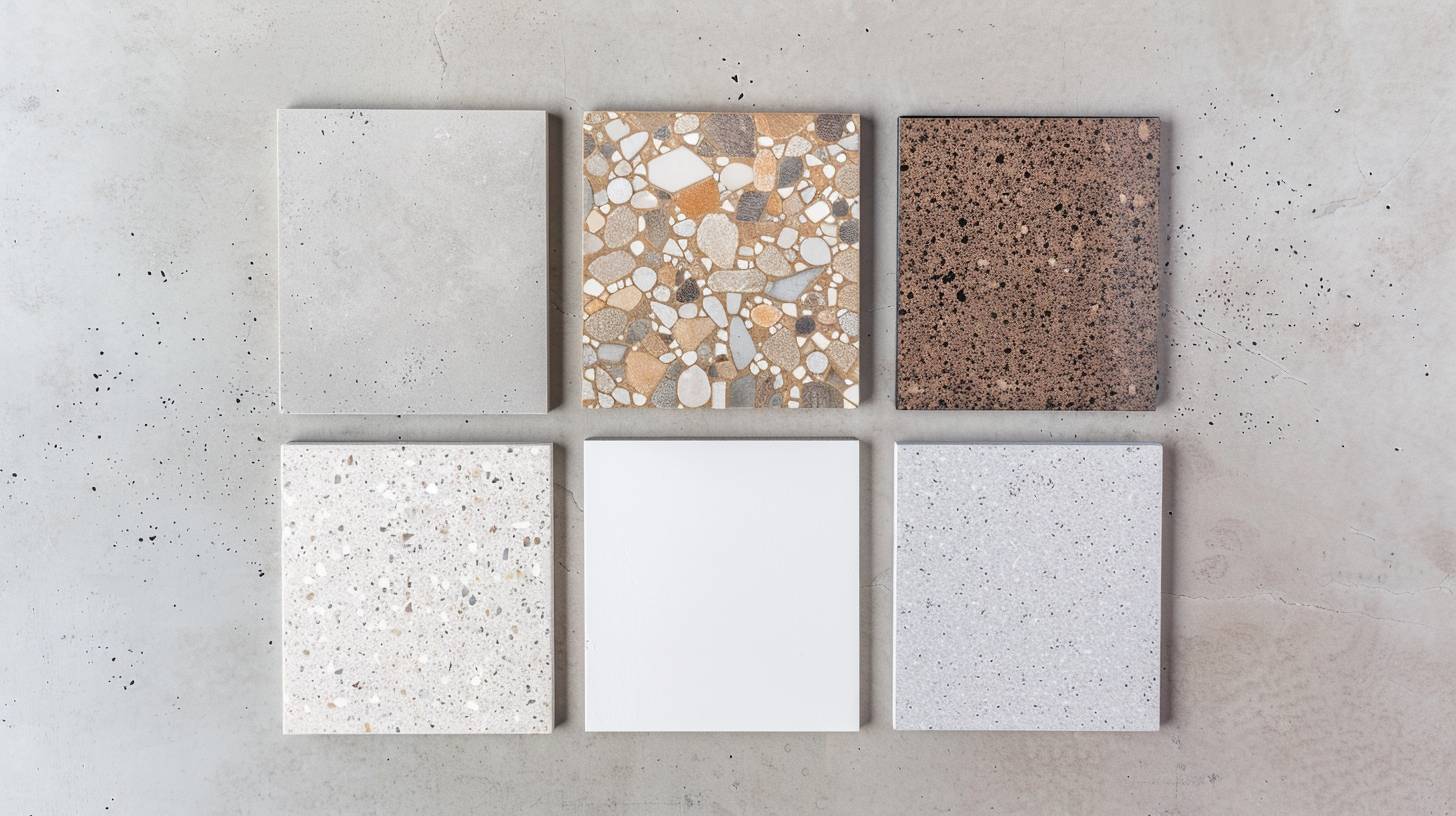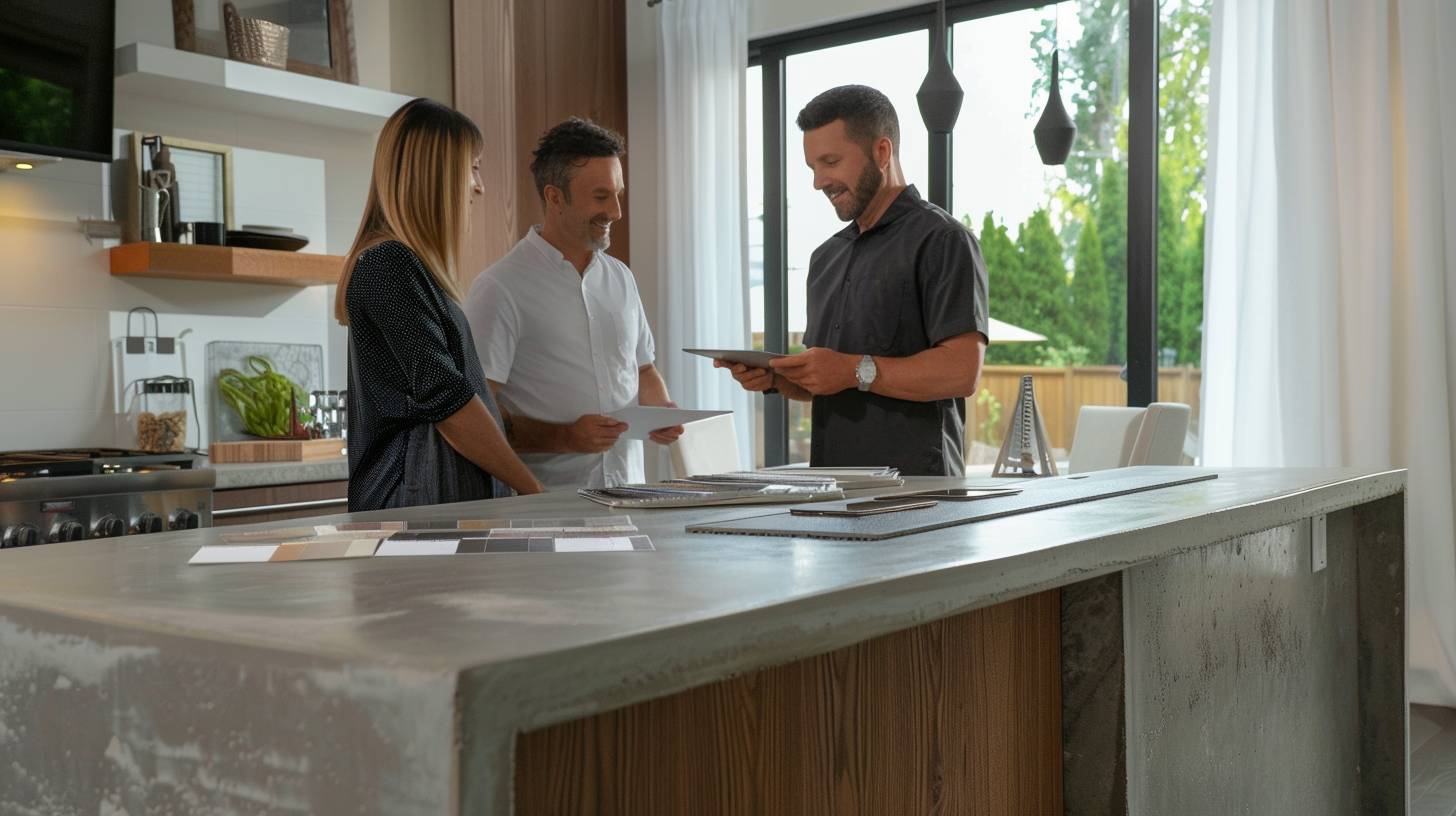Table of Contents [hide]
Looking at concrete flooring contractors? The difference between a glossy showpiece and a dusty headache is slab prep, moisture testing, and the right system for your space. The best teams repair cracks, grind the surface, and specify finishes that resist stains, slips, and heavy traffic.
This guide helps you vet pros, compare polished, stained, sealed, or microtopping systems, and set a timeline and budget you can trust. Learn how concrete floors perform in kitchens, basements, shops, and offices, and which questions prevent delays, change orders, and costly rework.
What Is a Concrete Flooring Contractor?
A concrete flooring contractor is a specialist who evaluates slabs, fixes defects, prepares surfaces, and installs finish systems like polished concrete, decorative overlays, and epoxy coatings. They coordinate equipment, materials, safety, and protection for adjacent areas.
What They Actually Do
- Inspect slab condition, flatness, moisture, and cracks.
- Repair spalls, joints, and control cracks.
- Profile the surface by grinding or shot blasting for proper adhesion.
- Install the selected finish and protect areas from dust and overspray.
- Manage waste disposal and jobsite safety.
When You Should Hire One
- You see cracks, spalling, or uneven spots.
- You want a durable, low-maintenance finish for garage, basement, retail, or production areas.
- You need better light reflection, chemical resistance, or dust control.
- You are converting a space and must meet slip or hygiene requirements.

Concrete Flooring Solutions
|
FEATURE |
POLISHED CONCRETE |
DECORATIVE CONCRETE |
EPOXY AND POLYASPARTIC COATINGS |
|
Core Benefit |
Long-lasting, low upkeep |
Custom color and texture |
Chemical resistance and durability |
|
Typical Build |
In-slab polish, no film |
Stain or microtopping with sealer |
Multi-layer film system |
|
Look Options |
Satin to mirror gloss |
Variegated stains, stamped, dyes |
Solid, flakes, or quartz broadcast |
|
Traction Options |
Grip pads or treatments |
Texture via stamp or additive |
Additive flakes or quartz |
|
Return To Service |
Same day to next day |
1 to 3 days |
Same day to 3 days |
|
Best For |
Retail, schools, warehouses |
Showrooms, living areas, lobbies |
Garages, kitchens, and manufacturing |
Polished Concrete
Polished concrete uses mechanical grinding to harden and refine the slab for a clean, reflective finish. It resists dusting, handles heavy traffic, and keeps maintenance simple with routine cleaning rather than coatings or wax cycles. See this guide to polished concrete terms to choose your gloss level with confidence.
- Key Advantages: Long life, low upkeep, with satin to high-gloss options.
- Best For: Retail, offices, warehouses, and schools.
Decorative Concrete
Decorative systems add color, pattern, and texture to transform plain slabs into design features. Stains, dyes, stamps, and microtoppings create custom looks that range from natural variegation to bold statement floors. For better design choices, use this easy guide to decorative concrete as a reference.
- Key Advantages: Custom color and texture with adjustable sheen.
- Best For: Showrooms, living spaces, patios, and lobbies.
Epoxy, Polyaspartic, and Other Coatings
Coating systems form a seamless film that boosts chemical resistance and durability. Options include high-build epoxies and fast-cure polyaspartics, with flakes or quartz to improve traction and style.
- Key Advantages: Strong chemical and stain resistance with flexible thickness.
- Best For: Garages, basements, food prep, labs, and production areas.
The Benefits of Concrete Floors
Unmatched Durability
Concrete floors are tough. With the right prep and finish, they handle carts, forklifts, pets, and daily foot traffic without giving up. Repairs and moisture testing up front help the surface last longer and look better.
Aesthetic Versatility and Customization
Concrete floors are also surprisingly stylish. You can choose acid or water-based stains, metallic epoxy, dyes, microtoppings, or colored flakes to match a brand palette or home style. From soft, natural movement to a bold, glossy showpiece, the look is entirely up to you.
Low Maintenance
Day-to-day care is simple. Polished concrete stays bright with routine dust mopping and an occasional burnish. Coated floors clean with a neutral cleaner, and when traffic builds up, a quick topcoat refresh brings back the original sheen. If traffic builds up over time, a light scrub and a simple polished concrete maintenance routine keep floors looking new.
Cost-Effective
Concrete can be cost-effective over the life of the floor. Because it is durable and easy to maintain, you spend less on frequent replacements or heavy maintenance. Typical installed prices vary with slab condition and regional labor.
- Grind and Seal or Basic Coating: $3 to $7 per square foot
- Polished Concrete (multi-step, densified): $5 to $12 per square foot
- High-Build Epoxy or Polyaspartic Systems: $6 to $12 per square foot
Heavily damaged slabs, moisture mitigation, or complex decorative work increase cost.
How to Choose the Best Concrete Flooring Contractor Near Me
Start with a short conversation about goals, timeline, and budget, then verify the plan in writing.
- Relevant Experience: Ask for recent residential installations and commercial facilities with similar use. Confirm concrete preparation methods like diamond grind prep and crack or surface repair.
- Written Scope and Schedule: Look for surface prep, moisture testing, product data, coat sequence, cure times, and the resurfacing process. Clarify access, heavy equipment, and downtime.
- Materials and Methods: Discuss epoxy systems, concrete coatings, polymer-modified cement overlays, and options like microtopping or concrete overlay. Ensure compatibility with your concrete subfloor.
- Quality Standards: Request targets for concrete flatness and levelness when relevant, and confirm final gloss for polished concrete.
- Insurance and Compliance: Verify liability coverage, worker safety practices, and any permit to pour concrete if new work or structural changes are planned. Grinding should follow simple dust-control rules for concrete work to protect your home and the crew.
- Warranty and Care: Get workmanship and manufacturer terms, plus maintenance schedules for concrete floor coating or polished systems.
FAQs About Concrete Flooring Contractors Near Me
Is polished concrete slippery?
Dry polished concrete has traction similar to many finished floors. Traction additives or mats can be used in wet zones.
Polished concrete or epoxy for a garage?
Polished concrete is low maintenance and resists hot tire marks. Epoxy or polyaspartic adds chemical and stain resistance and offers color and flakes. Choose based on exposure to oils, de-icers, and UV.
How thick are coatings?
Most residential systems range from thin-mil sealers to multi-layer builds. Ask for the total mil thickness and recoat windows.
What about moisture in slabs?
Moisture can cause coating failure. Reputable contractors test and may specify vapor mitigation if needed.
How do I maintain the floor?
Use neutral cleaners, soft pads, and routine dust control. Avoid harsh acids unless the system allows it.
Plan a Concrete Floor That Lasts
Great results come from aligning slab conditions, the right finish system, budget, and schedule. Share your space, traffic levels, and style goals so we can help you choose between polished concrete, decorative finishes, or high-performance coatings.
Mr. Remodel will connect you with vetted local pros, then help you compare itemized scopes, timelines, and warranties. Pick the team that communicates clearly, protects your space, and delivers durable, low-maintenance results.
Ready to get quotes from concrete flooring contractors? Tell us about your project, and Mr. Remodel will line up competitive proposals you can trust.





